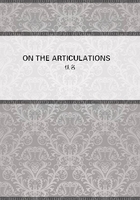Already, to the popular judgment, he who talks much about Virtue in the abstract, begins to be suspect; it is shrewdly guessed that where there is great preaching, there will be little alms-giving. Or again, on a wider scale, we can remark that ages of Heroism are not ages of Moral Philosophy; Virtue, when it can be philosophised of, has become aware of itself, is sickly and beginning to decline. A spontaneous habitual all-pervading spirit of Chivalrous Valour shrinks together, and perks itself up into shrivelled Points of Honour;humane Courtesy and Nobleness of mind dwindle into punctilious Politeness, 'avoiding meats'; 'paying tithe of mint and anise, neglecting the weightier matters of the law.' Goodness, which was a rule to itself, must now appeal to Precept, and seek strength from Sanctions; the Freewill no longer reigns unquestioned and by divine right, but like a mere earthly sovereign, by expediency, by Rewards and Punishments: or rather, let us say, the Freewill, so far as may be, has abdicated and withdrawn into the dark, and a spectral nightmare of a Necessity usurps its throne; for now that mysterious Self-impulse of the whole man, heaven-inspired, and in all senses partaking of the Infinite, being captiously questioned in a finite dialect, and answering, as it needs must, by silence, - is conceived as non-extant, and only the outward Mechanism of it remains acknowledged: of Volition, except as the synonym of Desire, we hear nothing; of 'Motives,' without any Mover, more than enough.
So too, when the generous Affections have become well-nigh paralytic, we have the reign of Sentimentality. The greatness, the profitableness, at any rate the extremely ornamental nature of high feeling, and the luxury of doing good;charity, love, self-forgetfulness, devotedness and all manner of godlike magnanimity, - are everywhere insisted on, and pressingly inculcated in speech and writing, in prose and verse; Socinian Preachers proclaim 'Benevolence' to all the four winds, and have Truth engraved on their watch-seals: unhappily with little or no effect. Were the limbs in right walking order, why so much demonstrating of motion? The barrenest of all mortals is the Sentimentalist. Granting even that he were sincere, and did not wilfully deceive us, or without first deceiving himself, what good is in him?
Does he not lie there as a perpetual lesson of despair, and type of bedrid valetudinarian impotence? His is emphatically a Virtue that has become, through every fibre, conscious of itself; it is all sick, and feels as if it were made of glass, and durst not touch or be touched; in the shape of work, it can do nothing; at the utmost, by incessant nursing and caudling, keep itself alive. As the last stage of all, when Virtue, properly so called, has ceased to be practised, and become extinct, and a mere remembrance, we have the era of Sophists, descanting of its existence, proving it, denying it, mechanically 'accounting' for it; - as dissectors and demonstrators cannot operate till once the body be dead.
Thus is true Moral genius, like true Intellectual, which indeed is but a lower phasis thereof, 'ever a secret to itself.' The healthy moral nature loves Goodness, and without wonder wholly lives in it: the unhealthy makes love to it, and would fain get to live in it; or, finding such courtship fruitless, turns round, and not without contempt abandons it. These curious relations of the Voluntary and Conscious to the Involuntary and Unconscious, and the small proportion which, in all departments of our life, the former bears of the latter, - might lead us into deep questions of Psychology and Physiology: such, however, belong not to our present object. Enough, if the fact itself become apparent, that Nature so meant it with us; that in this wise we are made. We may now say, that view man's individual Existence under what aspect we will, under the highest spiritual, as under the merely animal aspect, everywhere the grand vital energy, while in its sound state, is an unseen unconscious one; or, in the words of our old Aphorism, 'the healthy know not of their health, but only the sick.'
To understand man, however, we must look beyond the individual man and his actions or interests, and view him in combination with his fellows.
It is in Society that man first feels what he is; first becomes what he can be. In Society an altogether new set of spiritual activities are evolved in him, and the old immeasurably quickened and strengthened. Society is the genial element wherein his nature first lives and grows; the solitary man were but a small portion of himself, and must continue forever folded in, stunted and only half alive. 'Already,' says a deep Thinker, with more meaning than will disclose itself at once, 'my opinion, my conviction, gains infinitely in strength and sureness, the moment a second mind has adopted it,' Such, even in its simplest form, is association; so wondrous the communion of soul with soul as directed to the mere act of Knowing! In other higher acts, the wonder is still more manifest; as in that portion of our being which we name the Moral:
for properly, indeed, all communion is of a moral sort, whereof such intellectual communion (in the act of knowing) is itself an example. But with regard to Morals strictly so called, it is in Society, we might almost say, that Morality begins; here at least it takes an altogether new form, and on every side, as in living growth, expands itself. The Duties of Man to himself, to what is Highest in himself, make but the First Table of the Law: to the First Table is now super-added a Second, with the Duties of Man to his Neighbour; whereby also the significance of the First now assumes its true importance.















